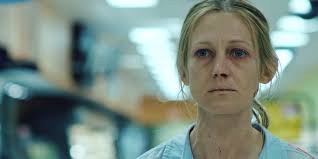

In the past few years, the phrase “psychological horror” has been getting thrown around a lot, with critics applying to films like It Follows, Get Out, The Witch, and even It. Most of the time it seems to be something of a catch-all for a horror film that operates outside the box; and people unfamiliar with the genre cannot comprehend a horror film doing so, thus they fall back on calling it “psychological horror” because it sounds fancy. But rarely does a horror film that is referred to as such actually rely on psychology to generate the feeling of horror, or actually use a character’s own mind, their very sense of self, to horrify the audience. Sure, the aforementioned films at times tended to be rather cerebral and relied more on atmosphere and dread than straight forward horrific imagery to achieve its goal of horrifying an audience, but with the exception of Get Out, films lumped into this category rarely delved inwardly to find that ultimate feeling of actual horror.

The Swerve is a film that relies entirely upon the uncertainty of not knowing one’s own mind as a source of horror, and it utterly decimates its goal of doing so. Writer and director Dean Kapsalis brings to life a restrained yet devastating vision of a woman whose seemingly perfect life is unraveling in front of (and behind) her eyes, and does so in a way that is absolutely haunting and despairing yet oddly beautiful and at times strangely tender.
The Swerve is the story of Holly (Azura Skye), a teacher with a life that is perfect on paper, but as we soon learn is far from idyllic. Her husband (Bryce Pinkham) is well-meaning but distant, obsessed with work and possibly unfaithful, her children are thankless brats who only acknowledge her when she doesn’t bend to their every whim, and her estranged sister (Ashley Bell) has made an unannounced — and, as we soon learn, unwanted — re-entry into their lives. Holly’s descent into madness is set off by something so innocent and everyday that it’s almost comical: one day while cleaning the kitchen she sees a mouse run out from behind her garbage can. This idea, of an unclean intrusion in the sterility and perfect order of her life, soon becomes a running theme in the film, and Holly’s life begins to rapidly spiral out of control in some very awkward and sad ways. One of her students is hopelessly in love with her, and she begins experiencing blackouts that she cannot account for. She may or may not have been responsible for a case of vehicular manslaughter. Coupled with this is her husband’s refusal to admit that there’s something wrong with her that can’t be solved with more medication for an unspecified mental illness, a sentiment her doctor echoes, and the film becomes a ninety-minute documentation of Holly unsuccessfully reaching for help until the crushing finale. And I do mean crushing. Rarely am I left without some kind of coherent statement to sum up my feelings once the credits roll; this was one time where I was left without any thing meaningful to say, and that is saying something. Without hyperbole, The Swerve was one of the most well-executed films in every aspect of the process that I have seen in a very, very long time.
Azura Skye is magnificent as our lead character, portraying a woman who is even at the best of times barely keeping it together and by the end of the film is a pathetic and fractured creature lurching from one moment to the next hoping to find some semblance of clarity. She seems constantly on the verge of either tears or violence, grinning and bearing her shitty kids being absolute monsters to her while revealing tiny flashes of heartache at the idea of her husband possibly being unfaithful. There’s one moment in particular that is so achingly sweet where she simply asks someone to hold her that is one of the most human and vulnerable moments I have ever seen in a film. Bryce Pinkham does an excellent job of balancing the possibly skeevy husband who ultimately is revealed to be a character who, while certainly flawed, is not the monster he very well could have been. And while her role is somewhat small, seeing Ashley Bell in this was a pleasant surprise. She is excellent as the annoying younger sister who is still somewhat endearing.
This film could very easily have been 90 minutes of watching someone fall apart and just having our hearts broken over and over and over again until finally they were smashed to tiny pieces by the ending, a feast for those who want little more from their horror than human wreckage. And I won’t lie: it’s not an easy watch. It’s awkward, uncomfortable, cringe-inducing, and deeply unsettling. But it’s worth seeing. There’s something magnetic about Skye’s performance, Kapsalis’ direction, and Daryl Pittman’s cinematography that makes it impossible to stop watching and keeps you hooked until the end because you, just like Holly, desperately need to figure all of this out. And therein lies the concept at the heart of it all, the very thing that makes this the consummate psychological horror film. There are no monsters. There are no spooky specters wailing in the dark waiting to jump out and scare the protagonist. All that’s there is a woman who is terrified of her own thoughts and who is completely uncertain as to what is real and what is all in her head, and that is absolutely a frightening thing to behold. From the ominous beginning to the utterly bleak ending, The Swerve will have you covering your eyes, but not so much that you can’t see what’s happening because you are helpless to look away.




